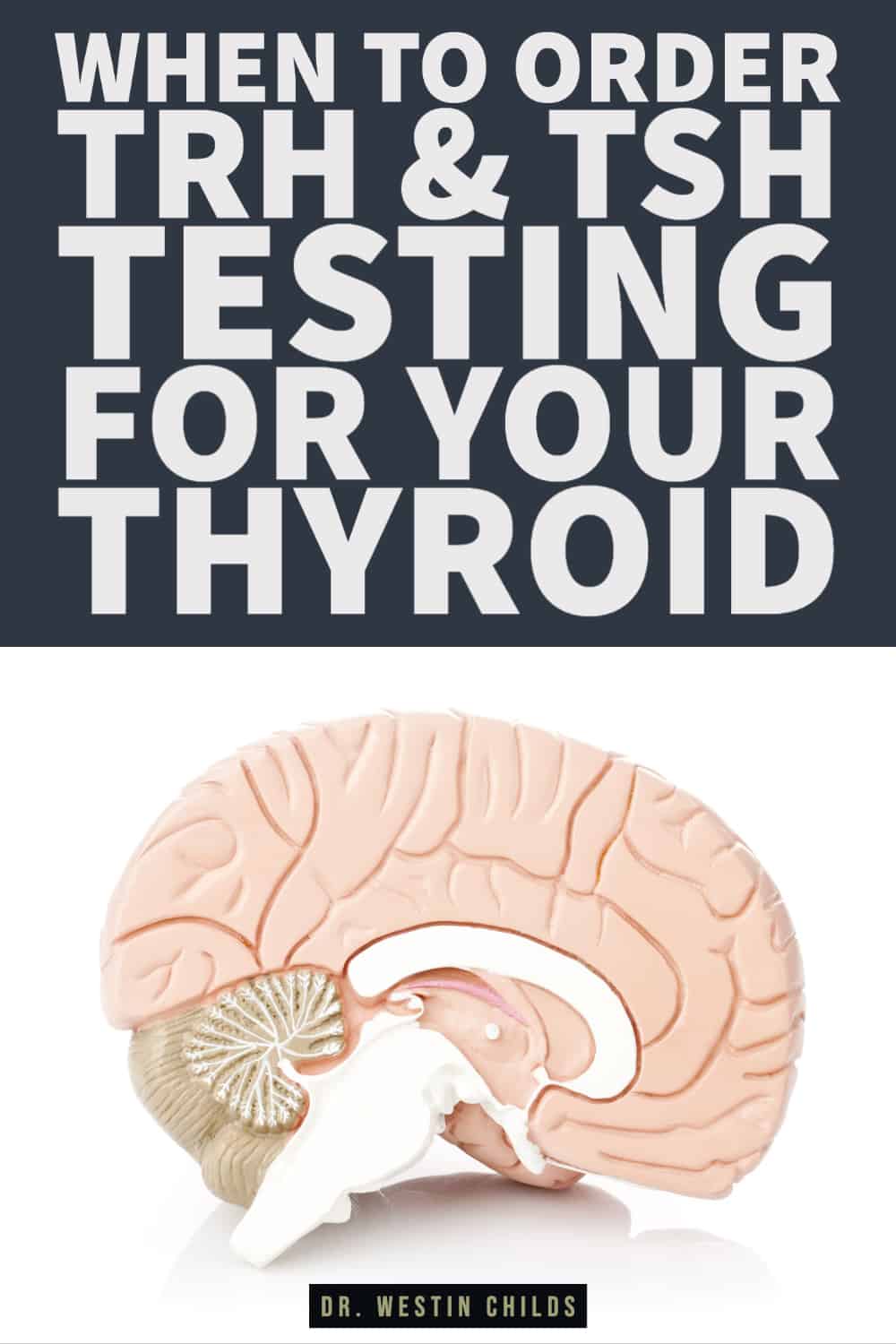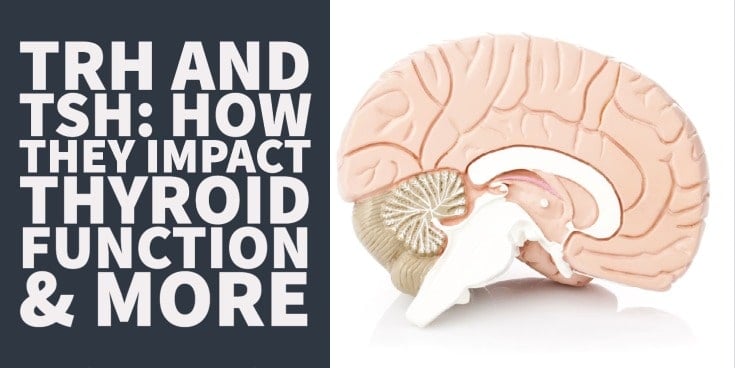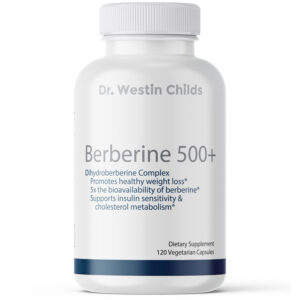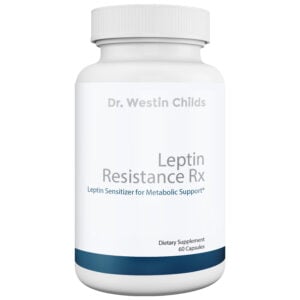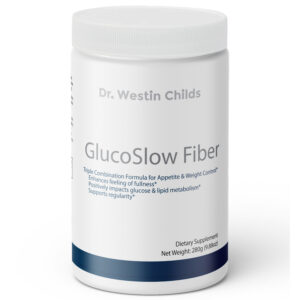TRH is an important hormone produced by your brain which regulates thyroid function in your body.
But most doctors aren’t ordering this important lab test!
In addition, certain problems can result in reduced levels of TRH which may manifest as hypothyroid symptoms.
Learn more about TRH including what it does, how it works, what causes low TRH, how low TRH can confound your clinical picture, and more:
The Hypothalamic-Pituitary-Thyroid Axis
You probably know all about your thyroid and why it is important.
How your thyroid gland helps regulate your metabolism (1), your weight, the amount of energy that you produce, and so on.
What may surprise you is that the entire system that regulates thyroid hormone starts in your brain.
Through various hormone messengers, your brain helps direct how much thyroid hormone should be produced and controlled at any given time.
This control starts with your hypothalamus with the production of TRH (2).
TRH, also known as thyrotropin-releasing hormone, is a hormone produced by your hypothalamus when stimulated by various factors in the bloodstream.
Your brain uses the hypothalamus as a sensor to determine how well the body is doing.
Is your appetite high or low enough for your needs?
Does your metabolism need to speed up or slow down?
Is your energy level sufficient for the activity that you are performing?
Are you experiencing abnormally high levels of stress?
Your hypothalamus senses all of these factors through secondary messengers and then responds by producing the exact amount of TRH necessary (3).
This is how your body controls and regulates thyroid function, but it doesn’t stop here.
TRH, once stimulated, acts on the pituitary gland (another organ in your brain located nearby) which stimulates the release of another hormone known as TSH or thyroid stimulating hormone.
You’ve probably heard a lot about TSH because this is the hormone that most physicians use to test for thyroid function.
Once TSH is produced, based on the amount of TRH produced (4), it then proceeds to act directly on your thyroid gland (located in your neck).
Under the influence of TSH, your thyroid gland is “stimulated” (that’s why they call it thyroid STIMULATING hormone!) to produce the active thyroid hormones T3 and T4.
These hormones then circulate through your body and act on your cells to produce the changes that your body needs.
This entire system is known as the hypothalamic-pituitary-thyroid axis and is tightly regulated at each and every step and it all starts with the production of TRH.
DOWNLOAD FREE RESOURCES
Foods to Avoid if you Have Thyroid Problems:
I’ve found that these 10 foods cause the most problems for thyroid patients. Learn which foods you should avoid if you have thyroid disease of any type.
The Complete List of Thyroid Lab tests:
The list includes optimal ranges, normal ranges, and the complete list of tests you need to diagnose and manage thyroid disease correctly!
TRH & Normal Thyroid Function
When you look at the entire picture of thyroid hormone regulation it’s easy to see why TRH is important.
It’s the hormone that triggers the cascade and release of all other thyroid hormones from TSH down to the active thyroid hormones.
With this in mind, it’s easy to see that TRH is critical for normal thyroid function.
Any problem which results in either abnormally high or low levels of TRH (5) will have serious downstream consequences on thyroid function in your body.
Let’s consider an example:
What if your body is able to produce some TRH but only at about 80 or 90% of normal?
What impact would this have on your body?
To start, it would result in a decreased amount of TSH production (lower than normal levels).
This lower-than-normal TSH would then be manifested by a decrease in circulating thyroid hormones.
This decrease in circulating thyroid hormones would result in symptoms ranging from fatigue to weight gain, and even depression.
The problem with TRH dysregulation is that it’s not a well-understood or heavily researched topic.
We know that there are certain factors that influence TRH regulation (more on that below), but these are not well studied and it’s not even well understood how to treat them, even if we know they exist.
But, they are incredibly important, especially for those who suffer from thyroid-related problems, because they may impact thyroid function in a negative way.
TRH Dysregulation and Symptoms Associated with it
It’s important to understand the difference between overt hypothyroidism (diagnosed by TSH) and TRH dysregulation.
Both of these conditions will result in the same set of symptoms, but the lab tests associated with each condition will differ in a slight but significant way.
The traditional way to diagnose hypothyroidism, or low thyroid function, is through the use of a test known as TSH (thyroid stimulating hormone).
Because TSH stimulates the release of thyroid hormone from the thyroid gland, you might expect that low levels of TSH would be associated with low thyroid hormone production.

This assumption turns out to be false, and a point of much confusion for patients, because of how regulatory feedback loops work in the body and what causes most thyroid dysfunction.
You see:
Most thyroid dysfunction occurs at the level of the thyroid gland itself, meaning your thyroid gland becomes LESS responsive to the influence of TSH.
This creates a cascade of events as follows:
Your thyroid gland, because it can’t produce thyroid hormone, produces a low level of circulating thyroid hormone.
These lower-than-normal levels signal to the brain that there isn’t enough thyroid hormone which causes an increase in TRH.
TRH stimulates the release of TSH.
TSH attempts to “stimulate” the thyroid gland but it doesn’t work.
The cycle continues and both TSH and TRH will increase (6).
Doctors then check your TSH level and when it reaches a certain “high” point (usually greater than 5.0 U/mL) your doctor will diagnose you with hypothyroidism.
The traditional pattern of hypothyroidism via testing:
- High TRH –> Most doctors do not look at or order TRH
- High TSH –> This is what most doctors order and look for
- Low thyroid hormones –> Doctors may or may not order thyroid hormones
This is how most physicians diagnose patients with thyroid disease, but what if the main problem (or even secondary problem) is related to your TRH and not your TSH?
The pattern associated with TRH dysregulation is much different from traditional hypothyroidism because TRH is the hormone that stimulates the release of TSH.
- Low TRH
- Low TSH –> You may have the symptoms associated with hypothyroidism but be falsely misdiagnosed because the TSH appears “normal”.
- Low thyroid hormones
So in TRH dysregulation, you will actually have low levels of TSH, TRH, and thus thyroid hormone.
What does this mean for you?
It means that problems associated with a low TRH may present with the symptoms of hypothyroidism and they may be missed if your Doctor is only looking at your TSH.
The symptoms of low TRH (or TRH dysregulation) include:
- Fatigue or low energy
- Mild weight gain
- Appetite dysregulation (mismatch between food consumption and appetite)
- Lower than normal body temperature
- Slower than normal heart rate
- Slower than normal metabolism
- Difficulty with sleep
None of this would even be an issue if TRH dysregulation was an uncommon occurrence.
But, there are many emerging conditions that may artificially lower your TRH and result in quality of life issues that may be missed by your physician and by routine testing.
Factors that Lower TRH Secretion
Why are these factors important?
Because they negatively influence your body’s ability to produce TRH.
This will result in sub-optimal thyroid levels in your body and symptoms such as those listed above.
Furthermore, they will NOT be picked up by standard laboratory tests (unless you specifically ask for TRH or free thyroid hormones).
These conditions may explain why so many patients suffer from thyroid-related issues even though their thyroid is “normal”.
#1. Stress or High Cortisol
Put simply:
Stress may reduce TRH secretion and production.
What you need to understand about stress is that each person can tolerate a different amount.
So even two people exposed to the same stressful situation may react completely differently.
In addition, there appears to be a certain amount of stress which is healthy for your body, but stress beyond this point seems to impact the body in a negative way.
Stress includes exposure to events that cause an increase in cortisol including:
- Social stress
- Physical stress (exercise)
- Emotional stress
- Stress of daily life
- Lack of sleep
#2. Dieting & Starvation (Calorie restricted diets)
Another important factor that suppresses TRH production is starvation or any type of calorie-restricted diet.
These diets “work” (and I use this term loosely because they are only effective about 1% of the time) by reducing the number of calories that you consume relative to the amount that you burn.
The problem with these diets is that they almost always result in metabolic damage (a reduction in what’s known as your basal metabolic rate).
So even if you were burning 2,000 calories per day, if you reduce your intake to 1,000 calories per day your hypothalamus will tell your body to burn less over time.
This is sometimes referred to as “starvation” mode and it’s the clinical manifestation of damage to your metabolism (8).
Dieting and restricting the number of calories that you consume on daily basis for as few as 3 weeks is enough to trigger this phenomenon.
Another huge problem is that this damage has been shown to persist for YEARS afterward (9).
#3. Inflammation
Inflammation, of any kind, can also cause TRH dysregulation (10).
Inflammation is a nonspecific term used to describe a cascade of cellular events which may cause damage to your entire body.
Inflammation can be caused by trauma, infections, bacterial overgrowth syndromes, chronic pain syndromes, and more.
The point here is that high inflammatory levels have been shown to suppress TRH production and may result in sub-optimal thyroid function.
You can check for general inflammatory markers such as CRP and ESR in the bloodstream which will sometimes notify you that there is a problem with your body.
If you have any sort of infection or trauma you will see a temporary (usually) rise in inflammatory markers.
The problem of inflammatory suppression of TRH comes when these levels remain consistently elevated beyond the “acute” phase (usually 4-6 weeks) of your illness or problem.
#4. Leptin Resistance
Leptin is a hormone that is produced by your fat cells and is commonly referred to as the “fat or obesity hormone”.
The goal of this hormone is to help your body burn fat and increase metabolism and it’s released when fat cells are “high”.
The goal of this hormone is to tell your body to balance out the equation and help burn some of the excess fat in your body by telling your hypothalamus to increase the number of calories that you burn.
Leptin resistance is when your body becomes resistant to this “message”.
Your brain thinks your body is in a state of starvation even though you are obese, so it responds by INCREASING your appetite and by lowering your metabolism.
This condition, by the way, is becoming more and more common with the amount of calorie-restricted diets (which can further confuse your brain/fat cell connection).
It’s been shown that people who are leptin resistant have TRH dysregulation which makes sense because TRH helps regulate your metabolism (11).
#5. Medications (Such as Chemotherapy and Steroids)
Certain medications (12), including those such as chemotherapy and steroids, can also cause issues with TRH levels in your body (13).
The most important in this discussion is probably glucocorticoids otherwise known as steroids.
Steroids are commonly used to reduce inflammation and used to treat conditions such as autoimmune diseases, arthritic conditions, and so on.
Recurrent exposure to steroids can impact thyroid function through its impact on TRH secretion.
Testing for TRH & TSH (Reference Range)
Can you test for TRH-related issues?
The answer is yes, you can!
TRH can be ordered through routine bloodwork and can be added to other hormone tests.
The standard reference range for TRH is between 5-25 U/ml.
TRH doesn’t need to be the first test that you order if you suspect thyroid dysfunction, but it can be added if your picture isn’t clear.
The standard way to assess thyroid dysfunction is by ordering TSH with occasional testing of free T4.
A better way to look at the entire spectrum of thyroid status (including conversion, production, and thyroid gland sensitivity) is to order the following tests:
- TSH
- Free T3
- Free T4
These lab tests will help determine what is happening in your body and can help you determine if you need TRH testing.
If your TSH is “normal” but your free T4 and free T3 levels are normal, but you may have symptoms of hypothyroidism, then this is an indication that you should look at hypothalamic function by ordering TRH.
TRH testing may help explain cases of “sub-biochemical” hypothyroidism (14) or cases in which TRH dysregulation is the primary cause of hypothyroidism and not your thyroid gland.
Understanding TRH can help explain why some patients experience significant hypothyroid symptoms while their “standard” thyroid lab tests remain normal.
Treatment & Supplements
What’s the best way to address TRH-related issues?
Your treatment should focus on identifying and eliminating the root cause of TRH dysfunction.
Looking back at the list of causes of low TRH will give you a better idea of where to start.
In my experience, the most common causes of low TRH come from stress, dieting, and leptin resistance.
These conditions can easily be assessed through tests such as serum cortisol, fasting serum leptin, and a careful evaluation of previous dieting patterns.
Addressing these issues may help to improve your thyroid dysfunction without the use of thyroid medications.
In some instances, you may potentially benefit from supplements designed to enhance thyroid function.
Supplements which help promote T4 to T3 conversion and which contain adaptogenic herbs may be helpful in those with thyroid dysfunction related to low TRH.
Conclusion
TRH is an important hormone involved in the regulation of thyroid function in your body.
Together with TSH and your thyroid gland, TRH is part of the HPT axis.
This axis is easily disrupted when exposed to certain conditions such as stress, dieting, and other hormone imbalances.
These problems may manifest as quality-of-life symptoms such as low energy, weight gain, and even mood problems.
Diagnosing TRH-related issues is easy if also accompanied by a complete thyroid panel.
Now I want to hear from you:
Do you suspect you have TRH-related issues?
Do you have the symptoms of hypothyroidism but still retain normal lab tests?
Are you struggling with a diagnosis?
Why or why not?
Leave your comments or questions below!
